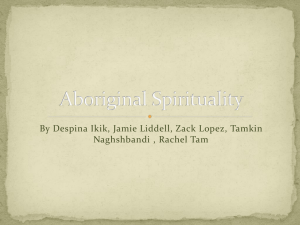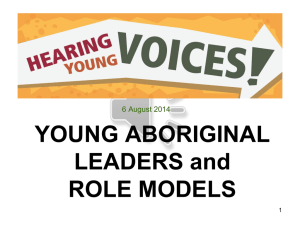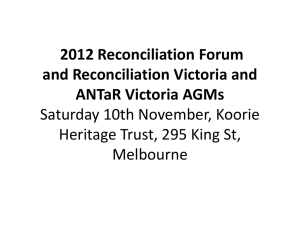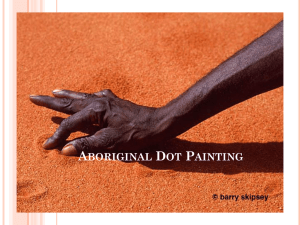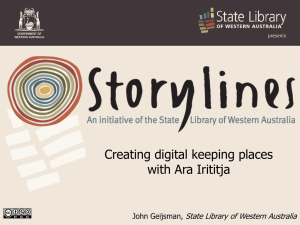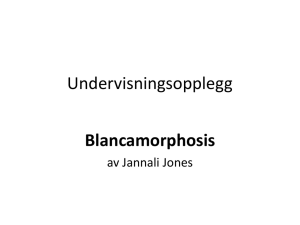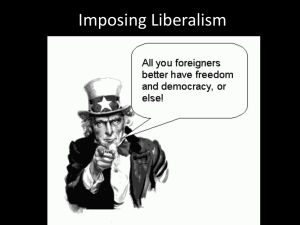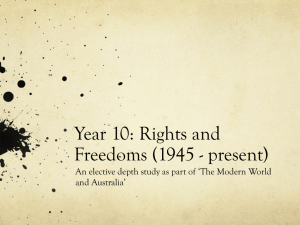The Inherent Right to Self-Government 2056KB Nov 03 2011 10
advertisement
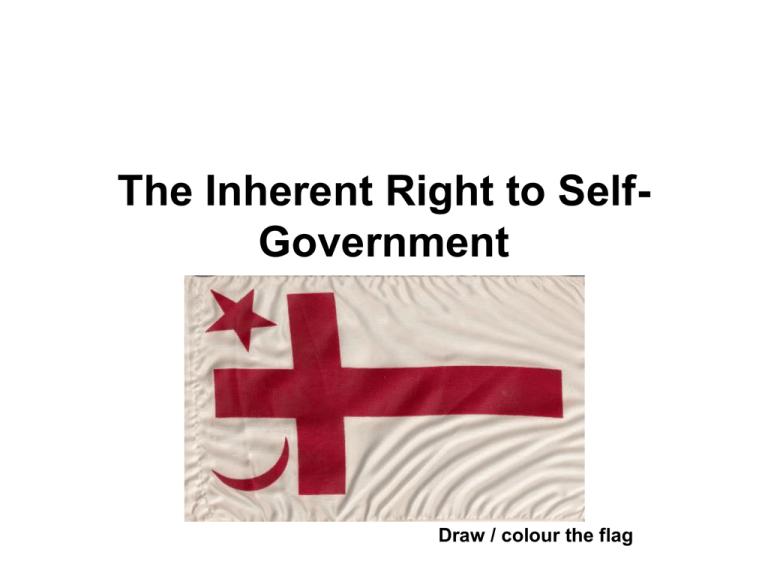
The Inherent Right to SelfGovernment Draw / colour the flag Historical Context Before Europeans settled in Canada centuries ago, Aboriginal people governed themselves in organized societies. Each nation of Aboriginal people had its own territories and councils of chiefs. They were governed by oral constitutions. The ability to recount laws, traditions and histories was important to keep the peace. As with any human institutions, those of Aboriginal societies had evolved and changed over time, and would have continued to do so given the opportunity. In the early years of contact, Europeans recognized that Aboriginal societies truly were independent nations. That recognition almost disappeared during the next two centuries, and resurfaced only in the 1970s. By the 1970s, Aboriginal activists had forced the federal government to consider the idea of Aboriginal self-government. But the government viewed self-government as a gift to be bestowed (meaning to give) by Canada on Aboriginal peoples. Aboriginal peoples rejected that viewpoint, asserting that they had an inherent right to govern themselves. An inherent right is a right that automatically belongs to people, rather than a gift that people receive. What is the message here? Is it positive or negative? Aboriginal people argued that their right to self-government existed because their societies historically had been organized and self-ruling. Today, Aboriginal leaders are insisting that the Canadian Constitution should be changed to include the inherent right of Aboriginal peoples to govern themselves. Side Note: Do you think Mi’kmaw wore head dresses like this one before contact? Nope Traditionally Mi’kmaw men would have worn something similar to this – can you imagine running through NS forests with the other type of head dress on. That type of head dress came from the Plains Natives – where there were no trees. Question 1a) Explain the term “inherent right to selfgovernment.” b) Do you think self-government is a good idea? Explain. Making Self-government a Reality Context: Self-government means that Aboriginal peoples would have/will control such matters as social services, health care, education, resource development, culture, language and justice. As well, First Nations bands will decide who can join the band and how band government will be organized. With the implementation of the Indian Act in the late 1800s, Aboriginal peoples across the country lost their ability to govern themselves. Something that had been so intrinsic (natural and important) and relevant to who they were and how they oversaw the needs of their communities, was taken from them, and with it, their ability to respond to the moment. Their independence and liberty to deal with what life throws in their direction was lost. They were to become limited in ability and dependent on Ottawa for their existence. Great concern was expressed over this. In advocating Aboriginal self-government, many questions have been asked in trying to decide what Aboriginal self-government may look like. What form will it take on? Everything from a House of First Peoples (an Aboriginal parliament) to applying selfgovernment to the 60 to 80 historical Aboriginal nations in Canada, reflecting the different traditions of separate nations. Both Aboriginal people and nonAboriginal people agree that any hope for change depends on Aboriginal peoples gaining more control over their lives, specifically through self-government. Question 2. Why do so many Aboriginal peoples want self-government today? Provide two explanations. Concerns About Selfgovernment Concerns about self-government include: the power of chiefs and councils; the rights of women; the situation of Aboriginal people not living on Aboriginal owned land; the situation of non-Aboriginal people living on land that becomes part of an Aboriginal nation through land claims settlements. Conceived Concerns & Issues: In many communities that are moving toward self-government, the chief and council have total control of finances and administration. The challenge for communities will be to create a government with checks and balances to guard against misuse of administration powers. Recent Headlines • 'Corrupt practices' in Shubenacadie band election’ CBC • ‘Shubenacadie band questioned about $277K cheque’ CBC Some Aboriginal women worry that, as citizens of Aboriginal nations, the Charter of Rights and Freedoms will not protect them. The challenge will be to create systems that give women a voice and protect them against abuse and discrimination. Who will have jurisdiction (meaning responsibility) for Aboriginal peoples who do not live on reserves? Creating systems of government is one of the most challenging tasks humans face. For Aboriginal nations, consultation (discussion and open dialog) and the determination to change the systems that have failed them will be important steps in achieving self-government throughout Canada. Question 3a) Identify three concerns about selfgovernment. Are they fair? Explain. b) What are some concerns you have as a Canadian citizen? c) Create a political cartoon highlighting one or more of the issues you identified. Use white paper Hot Seat

